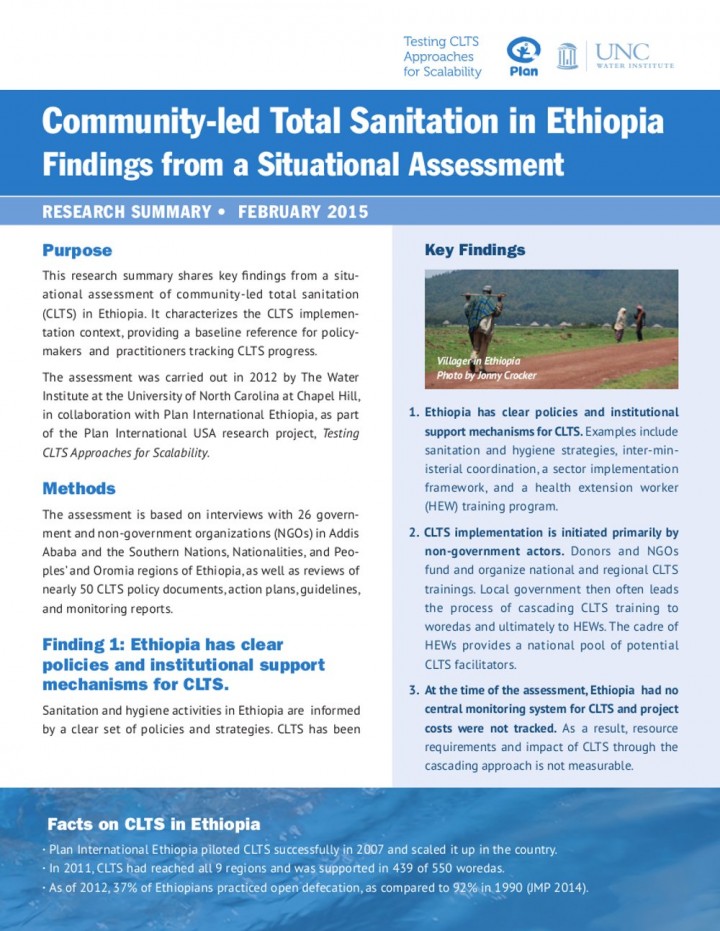This library entry contains background documents for a grant that Darren Saywell is leading and which is funded by the Bill and Melinda Gates Foundation.
Further information is also available on the SuSanA discussion forum, see link below.
Short description of the project:
Community-Led Total Sanitation (CLTS) was developed in 2000 as a way to generate change in sanitation behaviors, which can then stimulate both demand and supply for improved sanitation and sustainable reductions in open defecation (OD). While CLTS has shown promising results, there are elements and challenges inherent in the CLTS approach that hinder the overall effort to efficiently and effectively scaling the intervention. In particular, the requirement of labor-intensive facilitation, community by community, makes CLTS slow and costly to scale. NGOs most commonly lead facilitation, dependent on donor funding and geographic coverage. Efforts to transfer CLTS facilitation to relevant government entities have also struggled to secure sufficient motivation and resources to effectively implement the approach at scale. Removing these obstacles through modified CLTS methodologies and practices could significantly improve the coverage of the approach.
Goal(s):
To advance rural sanitation efforts in Kenya, Ethiopia, Ghana and worldwide by improving the cost-effectiveness and scalability of the CLTS approach through increased engagement of local actors, such as teachers, local government officials and natural leaders.
Objectives (set at project start in 2011):
1. Learning. Plan and UNC designed and implemented applied research pilot projects that test solutions to locally-relevant global CLTS scaling challenges in Ethiopia, Ghana, and Kenya. Plan International has implemented CLTS for several years in each of these countries; based on this knowledge and analysis of existing barriers to implementation at scale, the pilots were designed to address three strategic challenges. The project applies experimental research standards and deliberate project design guidelines to test modified CLTS methodologies for local actor engagement that address these challenges, in a manner that will allow the partners to evaluate, document, and disseminate its experiences and innovations.
2. Capturing. The collection of knowledge, tools, and lessons learned is a central activity of the project, and is conducted with the extensive support of researchers at UNC. This includes the systematic capture and evaluation of results from the pilot interventions, supplemented by innovations and expertise from Plan International’s global CLTS experience. UNC also supports Plan in conducting a broad literature review, and collecting and developing standardized metrics for sanitation programming.
3. Sharing. We disseminate the knowledge collected and the results of the research pilots to internal and external practitioners and researchers in the sanitation sector. Specific dissemination activities will include publication of research pilot results, exchange visits among pilot countries, publication of knowledge collected (leading practices, methods, tools, case studies, etc.) through both traditional publications and web-based resources, and coordination of learning events at the regional and global levels.
+++++++++++
Documents available for download below:
1 - Community-led Total Sanitation in Ethiopia. Findings from a Situational Assessment, research summary, Feb. 2015 (by Jonny Crocker and Ryan Rowe)
2 - Community-led Total Sanitation in Ghana. Findings from a Situational Assessment, research summary, Feb. 2015 (by Jonny Crocker and Jen Bogle)
3 - Community-led Total Sanitation in Kenya. Findings from a Situational Assessment, research summary, Feb. 2015 (by Jonny Crocker and Ryan Rowe)
4 - Community-led Total Sanitation Research Brief. Implementation Context in Kenya, Ghana, and Ethiopia. Learning brief, March 2015
5 - Community-led Total Sanitation in Cambodia: Findings from an Implementation Case Study. Learning brief, July 2015 (by Vidya Venkataramanan, Jen Bogle, and Ryan Rowe)
6 - CLTS Learning Series: Cambodia Country Report, October 2014 (by Vidya Venkataramanan)
Bibliographic information
Various authors (2015).
Testing CLTS Approaches for Scalability Various documents on results from research grant Plan International, USA
Filter / Tags
Fundamental research and engineeringRuralPractitionersEnglish
External links
Further information on discussion forum
Downloads
1 - Community-led Total Sanitation in Ethiopia. Findings from a Situational Assessment, research summary, Feb. 2015
Download
Type: application/pdf
Size: 2.41 MB
2 - Community-led Total Sanitation in Ghana. Findings from a Situational Assessment, research summary, Feb. 2015
Download
Type: application/pdf
Size: 2.43 MB
3 - Community-led Total Sanitation in Kenya. Findings from a Situational Assessment, research summary, Feb. 2015
Download
Type: application/pdf
Size: 2.81 MB
4 - Community-led Total Sanitation Research Brief. Implementation Context in Kenya, Ghana, and Ethiopia. Learning brief, March 2015
Download
Type: application/pdf
Size: 0.32 MB
5 - Community-led Total Sanitation in Cambodia: Findings from an Implementation Case Study. Learning brief, July 2015
Download
Type: application/pdf
Size: 0.77 MB
6 - CLTS Learning Series: Cambodia Country Report, Oct. 2014
Download
Type: application/pdf
Size: 0.77 MB

Published in: 2015
Pages: 0
Publisher:
Plan International, USA
Author(s):
Various authors
Uploaded by:
Location of library entry:

